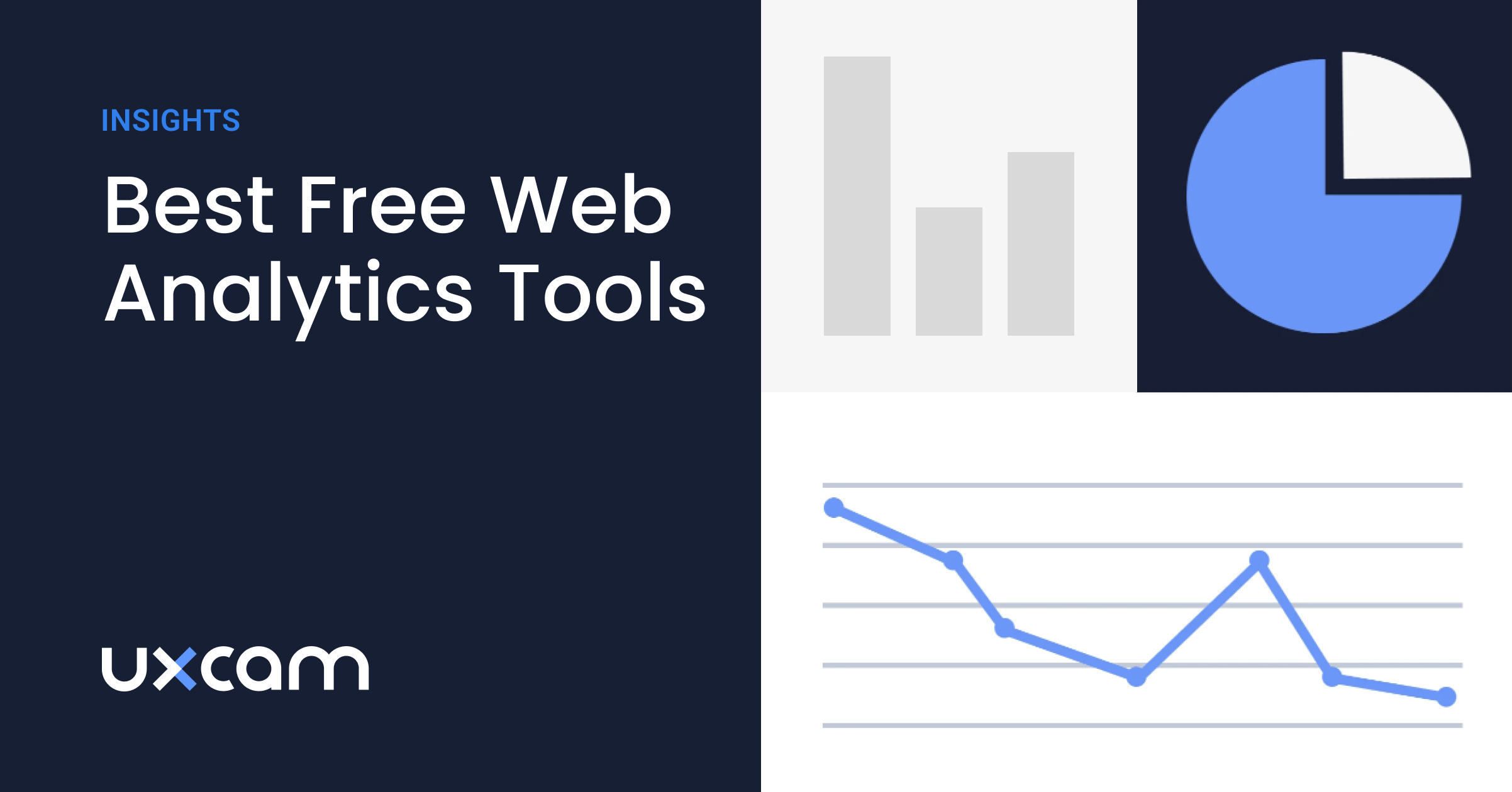Back to blog
26 MIN READ
21 Website Visitor Tracking Tools with Top-Rated User Reviews
PUBLISHED
1 February, 2025
Product Analytics Expert
Looking to find the perfect website visitor tracking tool for your business?
Understanding exactly how visitors navigate your website is key to enhancing user experience and boosting conversions. By analyzing where users click, how far they scroll, and which pages they linger on, you can pinpoint what's working and what needs improvement. Website visitor tracking tools provide these detailed insights by monitoring user behavior and engagement patterns.
But with so many options available, how do you choose the right one?
In this article, we'll guide you through the top 20 website visitor tracking tools rated by real users. Our goal is to help you find the best fit for your business needs by providing an up-to-date, comprehensive comparison.
Let's dive in and discover which tool is right for you.
Quick Summary
Here's our pick of the top 5 best web visitor tracking tools:
UXCam - Best for product tracking analytics.
Google Analytics 4 - Best for free web tracking.
Amplitude - Best for comprehensive product analytics.
Mixpanel - Best for In-depth behavior analytics.
Pendo - Best for product adoption tracking.
Comparison table - Best website visitor tracking tools
| Tool | Starting Price | Best For |
|---|---|---|
| Google Analytics 4 | Free | Free cross-platform tracking |
| UXCam | Free | Product tracking and analytics |
| Amplitude | Free (Basic), $49/month | Behavioral analytics and retention. |
| Mixpanel | Free (Basic), $24/month | In-depth product and behavior analytics |
| Pendo | Free (Basic), Custom | Product adoption and user feedback |
| Heap | Free (Basic), Custom | User behavior analysis without manual setup |
| Smartlook | Free (Basic), $55/month | UX improvements and user behavior insights |
| Mouseflow | $31/month | Form analysis and session recordings |
| Fullstory | Free Trial, Custom | Digital experience optimization |
| Lucky Orange | Free (Basic), $32/month | Conversion tracking and optimization |
| Leadfeeder | Free (Basic), $99/month | B2B lead generation |
| Hotjar | Free (Basic), $40/month | Heatmaps and user feedback |
| GoSquared | Free Trial, $9/month | Real-time tracking & CRM integration |
| Plausible | Free Trial, $9/month | Privacy-focused, simple website insights |
| Fathom Analytics | Free Trial, $15/month | Privacy-first website analytics |
| Appier AIRIS (formerly Woopra) | Custom Pricing | Customer journey tracking |
| Matomo | Free, $24/month | Self-hosted analytics and data privacy |
| Crazy Egg | Free Trial, $99/month | A/B testing and visualizing user engagement |
| Statcounter | Free (Basic), $17/month | Lightweight visitor and traffic analysis |
| Adobe Analytics | Custom Pricing | Enterprise-level analytics |
| Kissmetrics | $299/month | Tracking customer behavior trends |
How to use this comparison table
Consider pricing options: The Starting Pricing column helps you identify tools within your budget, including those offering free plans or trials.
Identify the right fit: Use the Best For column to see which tools are tailored to specific needs like UX optimization, product analytics, or privacy-focused tracking.
Pricing variations: Some tools offer custom pricing or have multiple tiers. It's advisable to check their official websites for the most accurate and detailed pricing information.
Feature set: While this table doesn't include the features column, consider reviewing the tools' features in detail to ensure they meet your specific requirements.
Updates and trials: Keep in mind that software offerings can change frequently. Take advantage of free trials or demos when available to test the tools before committing.
UXCam
We’re excited to announce that UXCam is now available for web! Known for its powerful mobile app analytics, UXCam is now expanding to help you track and optimize user experiences on your website, offering a new way to understand visitor interactions.
UXCam for Web focuses on user behavior analytics, letting you visualize how visitors interact with your site through session recordings, heatmaps, and advanced event tracking. These features allow you to pinpoint friction points, understand user intent, and refine your website’s design and functionality.
One of the key benefits of UXCam for Web is its session replay feature. You can watch real-time recordings of user sessions to see exactly how visitors navigate through your site, helping you identify pain points and optimize user flows. Heatmaps provide visual data on where users click, scroll, and spend time, giving you insights into how your design influences engagement.
With UXCam’s intuitive dashboard, tracking key metrics like conversion rates and session duration becomes easy. You can also capture detailed event data, helping you understand which elements of your website are driving engagement or causing drop-offs.
You can see a quick demo of UXCam here:
Key features of UXCam for Web:
Session replays: Watch recordings of user interactions to see where visitors get stuck.
Heatmaps: Visualize user engagement to understand design effectiveness.
Event tracking: Capture specific actions like clicks and scrolls to analyze user behavior.
User journey analysis: Map out entire user flows to optimize conversion paths.
Pros:
In-depth session recordings for real-time user behavior analysis.
Heatmaps offer visual insights into user engagement.
Event tracking simplifies identifying key pain points and successes.
Easy-to-use dashboard for tracking critical user metrics.
Cons:
As a new tool for the web, there may be a learning curve.
Some advanced features might require customization based on specific needs.
Overall, UXCam for Web will provide a powerful, user-centric approach to website tracking. By understanding real user behaviors and interactions, you’ll be able to improve your website’s performance and user experience, ensuring smoother journeys for your visitors
If you want to get free access, sign up for free here.
Google Analytics 4
G2 Rating: 4.5 out of 5 (6407 reviews)
Best for: Free cross-platform tracking
Google Analytics 4 (GA4) is Google’s latest analytics platform, designed to track website and app visitors using an event-based model. It offers deeper insights into user behavior and adapts to modern privacy standards, making it a valuable tool for understanding user journeys.
GA4’s standout feature is cross-platform tracking, which lets you track users across websites and mobile apps. It also comes with automatic event tracking, capturing key actions like page views and scrolls without extra setup, simplifying data collection for non-technical users.
GA4 is also built for privacy, offering cookieless tracking and compliance with laws like GDPR and CCPA. This makes it a future-proof option as data privacy rules evolve.
Key features of GA4 include:
Cross-platform tracking: Track user journeys across web and apps.
Automatic event tracking: Capture key interactions with minimal setup.
Privacy-centric: Designed for compliance with global privacy laws.
Predictive analytics: Get machine learning-powered insights.
Pros:
Tracks users across web and mobile.
Automatically records key events.
Built-in privacy features.
Offers predictive insights.
Cons:
Higher learning curve compared to older versions.
Some features may require technical knowledge.
GA4 is a powerful tool for tracking website visitors, providing both comprehensive insights and privacy protection. While it takes time to learn, its benefits make it a strong choice for modern website tracking.
Amplitude
G2 Rating: 4.5 out of 5 (2,180 reviews)
Best for: Behavioral analytics & retention.
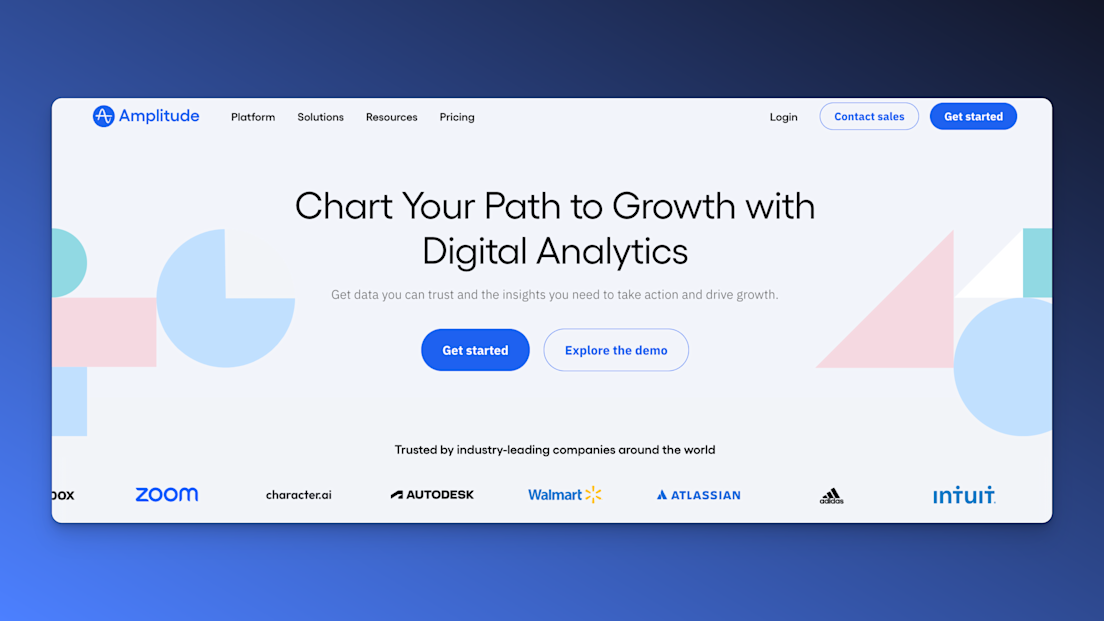

Amplitude is a powerful analytics tool designed to help you track website visitor behavior in detail. With a focus on product and user analytics, it provides insights into user journeys, helping you make data-driven decisions to improve your website’s performance and engagement.
One of Amplitude’s standout features is its ability to segment and track users across different stages of the customer journey. This allows you to see how users interact with your website over time, helping you identify trends, optimize funnels, and increase retention. Amplitude also offers cohort analysis, which enables you to group users based on their behavior and target them with personalized experiences.
Amplitude excels in its visual reporting capabilities. The tool provides clear, customizable dashboards to help you track key metrics like user engagement, retention, and conversion. Its predictive analytics capabilities also help you forecast future user behavior, making it easier to plan for long-term success.
Key features of Amplitude:
User segmentation: Track users based on behavior and lifecycle stage.
Cohort analysis: Group users by behavior patterns for targeted engagement.
Custom dashboards: Visualize key metrics in an easy-to-understand format.
Predictive analytics: Forecast future user behavior to improve retention.
Pros:
Excellent user segmentation and behavioral insights.
Powerful visualization tools for tracking key metrics.
Predictive analytics to guide decision-making.
Cons:
Can be complex for beginners.
Full benefits may require technical setup and analysis.
Amplitude is a go-to tool for businesses looking to deeply understand user behavior and make strategic improvements to their website and product experience.
Mixpanel
G2 Rating: 4.5 out of 5 (1125 reviews)
Best for: In-depth product and behavior analytics

Mixpanel is a leading tool for tracking website visitor interactions, offering deep insights through event-based analytics. It focuses on user behavior, allowing you to see how visitors interact with specific elements on your site, which can be essential for optimizing user experience and conversion rates.
Mixpanel’s real strength is its event tracking. It allows you to set up and monitor custom events—like clicks, form submissions, and page views—to gain a granular understanding of how visitors engage with your site. You can also create funnels to track user progress toward key actions, like signing up or making a purchase.
With Mixpanel, you can also conduct A/B testing and track the impact of changes to your website, making it easier to experiment and refine your user experience. The tool’s clear, customizable reports and dashboards help you monitor real-time data and gain actionable insights.
Key features of Mixpanel:
Event tracking: Monitor specific user actions like clicks and form submissions.
Funnel analysis: Track user progression through your website’s key flows.
A/B testing: Test different versions of your site to improve engagement.
Real-time reporting: Get live insights into visitor behavior.
Pros:
Strong event-tracking capabilities.
Real-time data and customizable reports.
Supports A/B testing for website optimization.
Cons:
Can be complex to set up advanced tracking.
May require technical skills for full customization.
Mixpanel is ideal for businesses looking to dive deep into visitor actions and optimize their website based on real-time data and detailed behavioral insights.
Pendo
G2 Rating: 4.4 out of 5 (1441 reviews)
Best for: Best for product adoption & user feedback.
Pendo is more than just a website visitor tracking tool—it combines analytics with in-app guidance to improve user experience. Originally designed for product teams, Pendo now helps website owners track visitor behavior while also providing tools to engage users with contextual guides, tooltips, and surveys.
What sets Pendo apart is its ability to track and measure user sentiment. Through built-in surveys and feedback tools, you can capture how visitors feel about your site or specific features, which helps guide design and functionality improvements. Pendo’s powerful analytics engine also tracks user journeys, giving you a full picture of how visitors navigate your website.
With its engagement features, Pendo allows you to target users with helpful messages or guides at the right moment, improving user onboarding or guiding them to complete specific actions. This combination of tracking and engagement tools makes it particularly useful for SaaS websites and customer-centric platforms.
Key features of Pendo:
User sentiment tracking: Gather visitor feedback with in-app surveys.
In-app messaging: Engage users with tooltips, guides, and pop-ups.
Journey tracking: Analyze user flows to identify engagement bottlenecks.
Behavioral analytics: Understand how visitors interact with key features.
Pros:
Combines visitor tracking with user engagement tools.
Offers real-time feedback and user sentiment tracking.
Easy-to-use for non-technical teams.
Cons:
May be overkill for simple websites.
Heavily focused on SaaS and product platforms.
Pendo is a great choice for websites focused on user engagement and retention, especially if you’re looking to combine behavioral tracking with feedback collection and in-app guidance.
Heap
G2 Rating: 4.4 out of 5 (1087 reviews)
Best for: User behavior analysis without manual setup

Heap stands out in the website visitor tracking space due to its no-code setup. With Heap, you don’t need to manually tag events or interactions—everything is tracked automatically. This makes it one of the most user-friendly tools for understanding website visitor behavior.
Heap’s key strength is its ability to retroactively capture user interactions without requiring you to set up event tracking ahead of time. This means that even if you forgot to track a certain user action, Heap has already been collecting the data for you. You can analyze user paths, conversion funnels, and engagement without any setup.
Heap also offers automatic event capture for all clicks, form submissions, and page views, and its visual dashboards allow for easy reporting. It’s particularly useful for teams who need robust data insights but lack the technical resources to set up complex tracking.
Key features of Heap:
Automatic event tracking: Capture all user interactions without manual setup.
Retroactive tracking: Access data on user behavior without prior configuration.
Funnel analysis: Visualize how users move through your website.
User-friendly dashboards: Intuitive reports for easy analysis.
Pros:
No coding required for event tracking.
Retroactive tracking ensures you never miss key data.
Simple, visual reporting.
Cons:
May not be as customizable as more advanced tools.
Could overwhelm with too much data at first.
Heap is perfect for teams who want powerful visitor insights without the technical overhead, offering comprehensive tracking out of the box.
Smartlook
G2 Rating: 4.6 out of 5 (871 reviews)
Best for: UX improvements and user behavior insights

Smartlook is an intuitive tool for tracking website visitors through visual means. It combines traditional analytics with session replays and heatmaps, allowing you to see exactly how users interact with your website and what might be causing drop-offs or frustrations.
Session replays are Smartlook’s defining feature. You can watch individual user sessions, giving you a real-time view of how visitors navigate your site. This helps you identify UX issues and optimize user paths. The heatmap functionality also shows where users are clicking, scrolling, or ignoring, offering a visual representation of engagement.
Smartlook also includes standard analytics, such as event tracking and funnel analysis. However, it’s the visual, user-centric approach that makes it stand out, giving you insights into user behavior that go beyond numbers and data tables.
Key features of Smartlook:
Session replays: Watch how visitors interact with your site in real time.
Heatmaps: Visualize clicks, scrolls, and user focus areas.
Event tracking: Track specific actions, like button clicks or form submissions.
Funnel analysis: Analyze conversion paths to find drop-offs.
Pros:
Provides visual insights through session replays and heatmaps.
Simple event tracking setup.
Great for identifying UX issues.
Cons:
Can be data-heavy, making it hard to prioritize fixes.
Some features may require customization for deeper insights.
Smartlook is ideal for websites looking for a user-centered approach to tracking, with a focus on improving the user experience through visual insights like replays and heatmaps.
Mouseflow
G2 Rating: 4.6 out of 5 (640 reviews)
Best for: Form analysis and user session recordings
Mouseflow is a website visitor tracking tool designed to give you a visual understanding of user behavior. By combining session replays and heatmaps, it helps you see exactly how visitors interact with your website, offering insights that go beyond numbers.
Mouseflow’s standout feature is its ability to track every user session in real-time. You can watch session replays to see where users click, scroll, or drop off, helping you identify friction points in the user experience. Its heatmap functionality shows you which parts of your site get the most attention, giving you actionable data for optimizing layouts and content.
In addition to these visual tools, Mouseflow provides traditional analytics like funnel tracking and form analysis. This allows you to pinpoint where users abandon key processes like signups or checkouts, making it easier to address issues that affect conversions.
Key features of Mouseflow:
Session replays: Watch real-time visitor interactions.
Heatmaps: Visualize user engagement across your site.
Form analytics: Track where users drop off during form submissions.
Funnel analysis: Identify conversion bottlenecks.
Pros:
Strong visual tools for understanding user behavior.
Easy to set up and start tracking.
Provides both qualitative and quantitative data.
Cons:
Data from session replays can be overwhelming.
Limited advanced analytics compared to some competitors.
Mouseflow is great for website owners who want to improve user experience through visual insights, making it easier to spot usability issues and optimize key processes.
Fullstory
G2 Rating: 4.5 out of 5 (767 reviews)
Best for: Customer and digital experience optimization
Fullstory is a robust website visitor tracking tool that provides detailed insights into user behavior through session replays, heatmaps, and in-depth analytics. Its goal is to help you create seamless digital experiences by showing you exactly how visitors interact with your website.
Fullstory’s key strength lies in its session replays, which let you watch how users navigate your site in real-time. The tool automatically captures every interaction, so you don’t need to manually tag events. This allows you to get a full picture of user behavior, from clicks and scrolls to more subtle actions like hovers or frustration signals.
In addition to session replays, FullStory offers detailed heatmaps and user journey analysis, helping you understand where visitors engage and where they encounter friction. It also integrates well with other tools like Google Analytics, allowing you to combine behavioral data with traditional metrics.
Key features of Fullstory:
Session replays: Watch how users interact with your website.
Heatmaps: Understand which areas of your site attract the most attention.
Frustration tracking: Detect user frustration signals like rage clicks.
User journey analysis: Visualize complete user flows.
Pros:
Automatic event tracking, no setup required.
Strong integration with other analytics tools.
Identifies frustration signals to improve UX.
Cons:
Pricey for small businesses or startups.
May overwhelm with data at first.
FullStory is perfect for businesses that want deep behavioral insights, making it easier to fine-tune user experiences and resolve pain points in the visitor journey.
Lucky Orange
G2 Rating: 4.6 out of 5 (229 reviews)
Best for: Conversion tracking and optimization


Lucky Orange is a website visitor tracking tool that offers session replays, heatmaps, and real-time analytics at an affordable price point. It’s designed for businesses looking for a straightforward way to understand how users interact with their website without breaking the bank.
Lucky Orange’s session replays allow you to watch how visitors move through your site, helping you see where they engage and where they drop off. Its heatmaps provide a visual breakdown of clicks, scrolls, and hovers, making it easy to identify which areas of your site attract the most attention.
One unique feature of Lucky Orange is its live chat and visitor polls, allowing you to engage with users in real time. This makes it possible to gather feedback and solve user issues on the spot, improving both experience and conversions.
Key features of Lucky Orange:
Session replays: Watch and analyze individual user sessions.
Heatmaps: Visualize user engagement on your site.
Live chat and polls: Engage with visitors in real-time for feedback.
Conversion funnels: Track and optimize key user journeys.
Pros:
Affordable, especially for small businesses.
Includes live chat and polls for real-time engagement.
Easy-to-understand heatmaps and session replays.
Cons:
Less advanced analytics compared to premium tools.
May not scale well for large websites.
Lucky Orange is ideal for small businesses and startups looking for an affordable, easy-to-use tool to track and improve visitor behavior and engagement.
Leadfeeder
G2 Rating: 4.3 out of 5 (710 reviews)
Best for: B2B website visitor tracking and lead generation
Leadfeeder is a website visitor tracking tool tailored to B2B companies. It specializes in identifying which businesses visit your website, turning anonymous traffic into actionable leads. By tracking visitor behavior, Leadfeeder helps you focus your sales and marketing efforts on high-value prospects.
One of Leadfeeder’s key features is its ability to reveal the company names behind your website visitors, along with detailed insights into their activity. This allows you to see which pages they visit and how long they stay, giving your sales team valuable context for outreach.
Leadfeeder also integrates seamlessly with CRM tools like HubSpot and Salesforce, making it easy to sync visitor data with your sales pipeline. This automation helps prioritize leads based on their interactions with your website, ensuring your team focuses on the most engaged prospects.
Key features of Leadfeeder:
Company identification: Discover which businesses visit your website.
Detailed visitor insights: See page views, session length, and more.
CRM integrations: Sync lead data with tools like Salesforce and HubSpot.
Lead scoring: Prioritize leads based on engagement levels.
Pros:
Perfect for B2B lead generation.
Integrates with popular CRM platforms.
Provides actionable insights for sales teams.
Cons:
Limited use for B2C businesses.
Requires a clear focus on lead generation to get value.
Leadfeeder is an excellent choice for B2B companies looking to turn website visitors into qualified leads, offering deep insights and seamless CRM integration.
Hotjar
G2 Rating: 4.3 out of 5 (306 reviews)
Best for: Heatmaps and user feedback collection
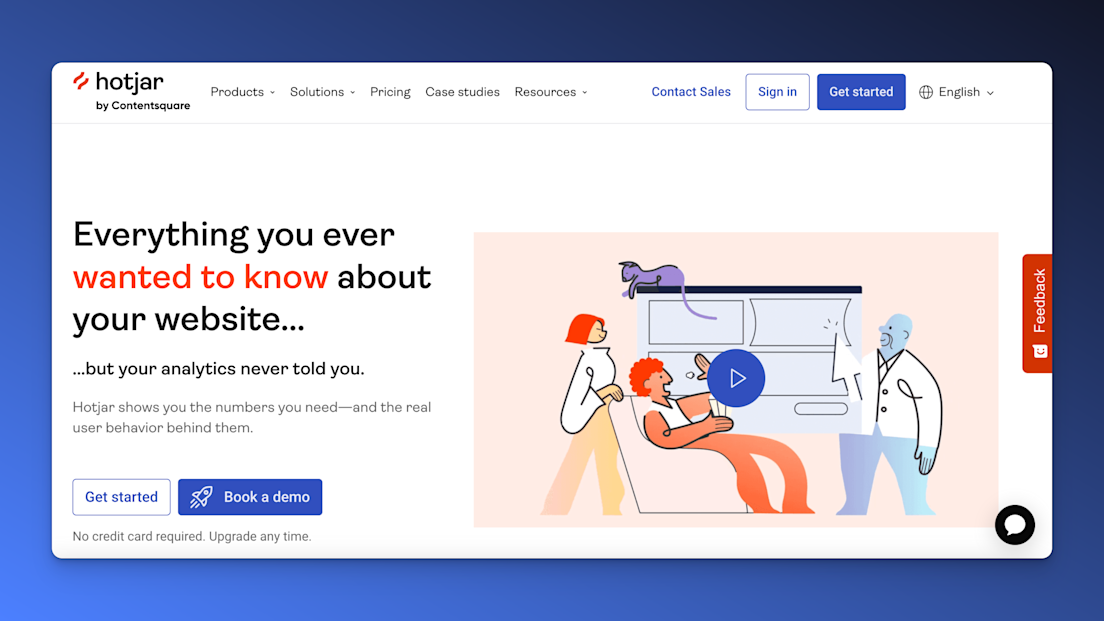

Hotjar is one of the most popular website visitor tracking tools, offering a combination of heatmaps, session recordings, and user feedback features. It’s designed to help you understand user behavior and gather real-time insights into how visitors experience your site.
Hotjar’s heatmaps show where users click, scroll, and focus, providing a visual breakdown of engagement on each page. Its session recordings let you watch individual user journeys, allowing you to spot usability issues and optimize the user experience.
In addition to these tracking tools, Hotjar’s feedback polls and surveys give you direct input from visitors, helping you understand their needs and frustrations. This blend of behavioral data and user feedback makes Hotjar a comprehensive tool for improving website performance.
Key features of Hotjar:
Heatmaps: Visualize how users engage with your site.
Session recordings: Watch user journeys to identify friction points.
Feedback polls: Gather real-time feedback from visitors.
Surveys: Understand user sentiment and satisfaction.
Pros:
Combines behavior tracking with direct user feedback.
Easy-to-use, even for non-technical teams.
Provides actionable insights for UX improvements.
Cons:
Lacks advanced segmentation compared to other tools.
Can become expensive for larger websites.
Hotjar is perfect for teams that want a well-rounded view of visitor behavior and direct user feedback, making it easier to improve user experience and conversion rates.
GoSquared
G2 Rating: 4.6 out of 5 (74 reviews)
Best for: Real-time tracking & CRM integration
GoSquared is a real-time website visitor tracking tool that provides live insights into how users interact with your site. It’s built for teams that need instant data to monitor user behavior and respond quickly to changes in traffic or engagement.
GoSquared’s live dashboards let you see how many visitors are on your site at any moment, where they’re coming from, and what they’re doing. This real-time data is crucial for teams running time-sensitive campaigns or monitoring high-traffic events. You can also set up alerts to notify your team when there’s a spike in traffic or a sudden drop in conversions.
Beyond visitor tracking, GoSquared also includes CRM functionality, allowing you to track leads and customers. This integration makes it a powerful tool for teams looking to combine visitor analytics with customer relationship management in one platform.
Key features of GoSquared:
Real-time analytics: Monitor live visitor activity on your site.
Team collaboration: Share insights and alerts with your team in real-time.
Traffic alerts: Set up notifications for spikes or drops in traffic.
CRM integration: Track leads and customer interactions alongside visitor data.
Pros:
Real-time data is perfect for monitoring live campaigns.
Easy to share insights across teams.
Combines visitor tracking with CRM features.
Cons:
Less focused on historical data compared to other tools.
May lack depth for advanced analytics.
GoSquared is ideal for teams that need real-time visitor tracking and collaboration, helping them react quickly to changes in user behavior and traffic patterns.
Plausible
G2 Rating: 4.5 out of 5 (31 reviews)
Best for: Privacy-focused website visitor tracking
Plausible is a lightweight, privacy-friendly website visitor tracking tool designed for businesses that want straightforward analytics without compromising user privacy. Built with simplicity and speed in mind, Plausible offers essential website metrics while ensuring full compliance with privacy regulations like GDPR, CCPA, and PECR.
Plausible’s primary focus is on delivering key insights such as page views, referral sources, and bounce rates in a minimalist dashboard. It doesn’t use cookies or collect personal data, making it a great option for businesses that prioritize user privacy. Despite its simplicity, Plausible provides powerful analytics that are easy to understand and act upon.
The tool is also incredibly fast, with a lightweight tracking script that won’t slow down your website. Plausible offers real-time data, so you can monitor visitor activity as it happens. It also supports goal tracking, helping you measure conversions and understand how visitors engage with key pages or actions.
Key features of Plausible:
Privacy-first tracking: Fully compliant with GDPR and other privacy laws, no cookies used.
Simple dashboard: Clean, minimalist interface for quick insights into visitor data.
Goal tracking: Measure conversions like form submissions or purchases.
Real-time analytics: Monitor visitor behavior as it happens.
Pros:
Easy to set up and use, with a lightweight tracking script.
Privacy-friendly, no need for cookie consent banners.
Fast and efficient, doesn’t slow down your website.
Cons:
Lacks advanced features like session replays or heatmaps.
Limited customization options for deeper analytics.
Plausible is perfect for businesses looking for a privacy-focused, easy-to-use visitor tracking tool that delivers essential metrics without unnecessary complexity or data collection concerns.
Fathom Analytics
G2 Rating: 4.6 out of 5 (15 reviews)
Best for: Privacy-first web analytics
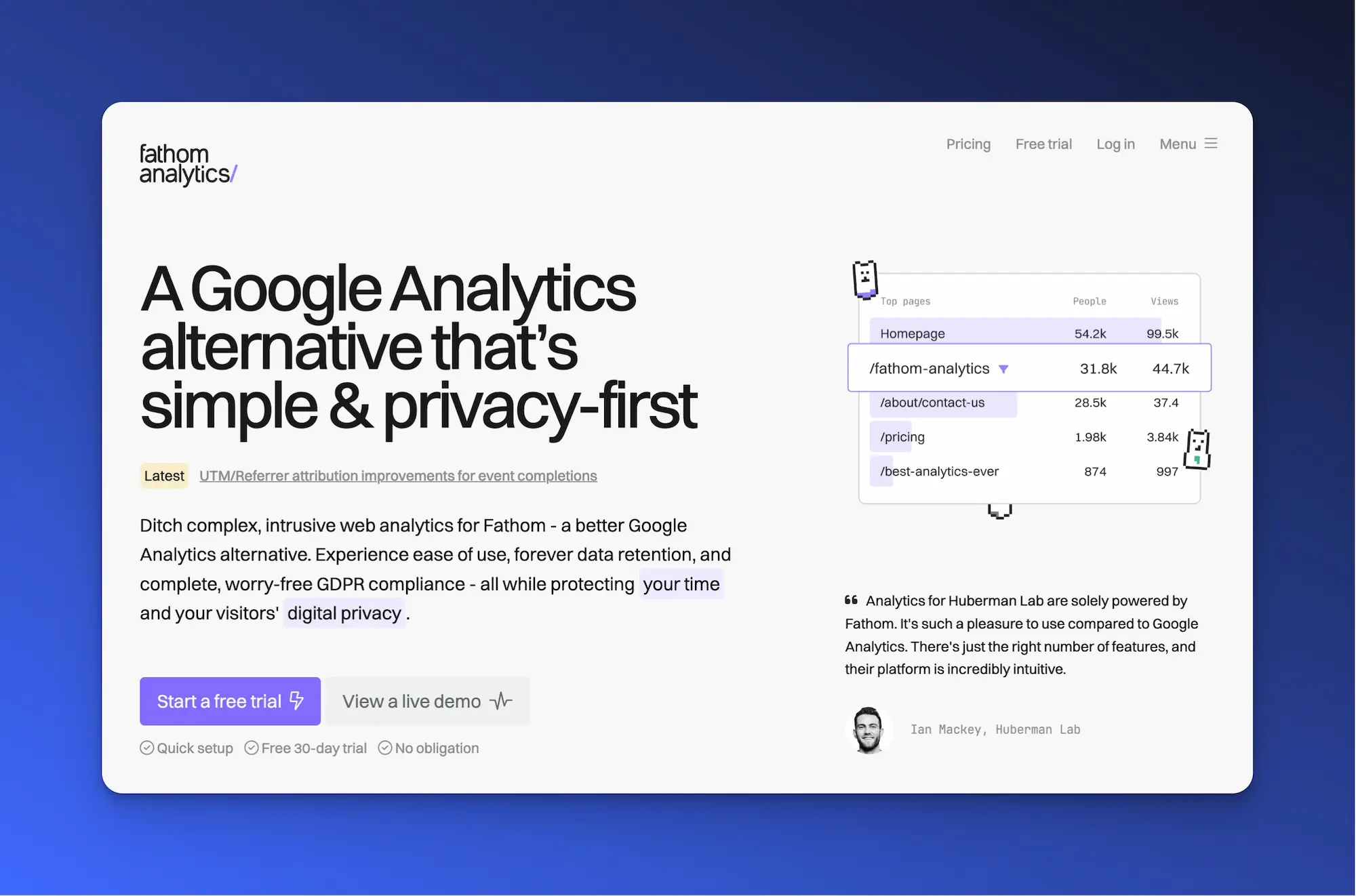
Fathom Analytics is a lightweight, privacy-first website visitor tracking tool. It’s designed for businesses that want to track user behavior while ensuring compliance with privacy regulations like GDPR and CCPA. Fathom simplifies the analytics process by focusing on the essentials, providing clean, easy-to-read reports.
Fathom’s main strength is its simplicity. The platform delivers straightforward metrics such as page views, bounce rates, and referrers without the clutter of more complex analytics tools. It’s also fully cookieless, which means you don’t have to worry about consent banners or compliance issues with privacy laws.
Fathom’s dashboard is designed for speed and simplicity, offering quick insights into user behavior. While it doesn’t offer advanced features like heatmaps or session replays, its focus on essential metrics and privacy makes it perfect for businesses that prioritize user trust and data compliance.
Key features of Fathom Analytics:
Privacy-first tracking: Cookieless and compliant with GDPR, CCPA, and other regulations.
Simple reporting: Provides clean, essential metrics without overwhelming you.
Fast performance: Lightweight script that doesn’t slow down your website.
Real-time analytics: See live data on visitor activity.
Pros:
Easy to set up and use.
Fully compliant with privacy regulations.
Doesn’t affect website performance.
Cons:
Lacks advanced features like event tracking or heatmaps.
Limited customization and segmentation options.
Fathom Analytics is perfect for businesses that value simplicity and privacy, offering an easy-to-use platform for essential visitor tracking without the need for complex features.
Appier AIRIS (formerly Woopra)
G2 Rating: 4.5 out of 5 (205 reviews)
Best for: Customer Journey Tracking
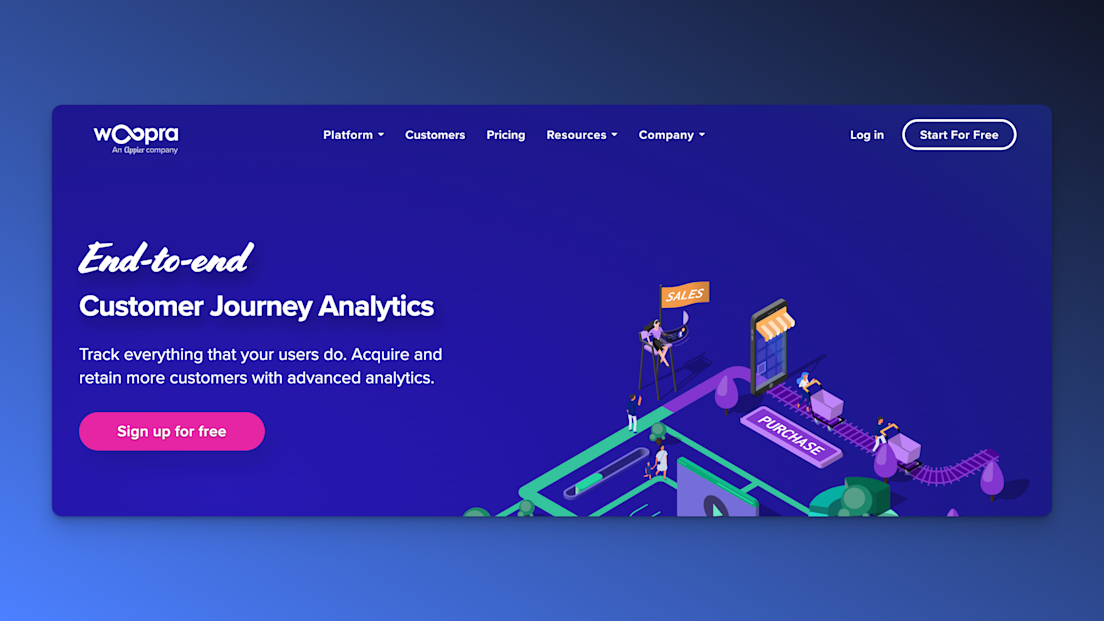

Appier AIRIS (formerly Woopra) is a website visitor tracking tool that focuses on customer journey analytics. It provides deep insights into user behavior across various touchpoints, allowing businesses to track the entire customer experience from the first visit to conversion.
AIRIS’s key feature is its ability to track user journeys across multiple platforms, including your website, mobile app, and email campaigns. This makes it a powerful tool for businesses with omnichannel strategies, helping you understand how visitors engage with your brand at every step.
The tool also offers real-time analytics, customizable reports, and user segmentation based on behavior. Additionally, AIRIS integrates with popular marketing tools like Salesforce, HubSpot, and Google Analytics, giving you a comprehensive view of your customer data.
Key features of Appier AIRIS:
Customer journey mapping: Track users across different platforms and touchpoints.
Real-time analytics: Get live insights into visitor behavior.
User segmentation: Group visitors based on behavior and engagement.
Integrations: Connect with CRM, marketing, and analytics tools.
Pros:
Excellent for tracking complex user journeys.
Real-time data with robust segmentation.
Integrates with a wide range of marketing and sales tools.
Cons:
Can be overwhelming for smaller websites.
Requires some technical setup to fully leverage its capabilities.
Appier AIRIS is ideal for businesses with a focus on customer journey optimization, helping you understand user interactions across multiple channels and touchpoints.
Matomo
G2 Rating: 4.1 out of 5 (91 reviews)
Best for: Self-hosted analytics and data privacy
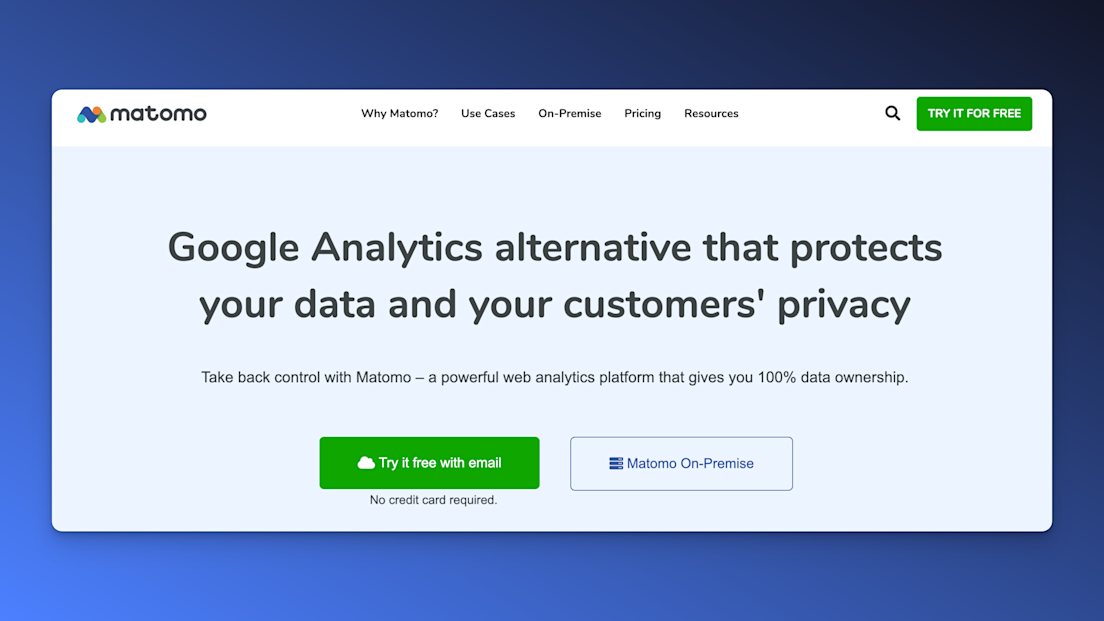

Matomo is an open-source website visitor tracking tool that prioritizes privacy and data ownership. Unlike other platforms, Matomo allows you to host your analytics data on your own servers, ensuring complete control and compliance with data protection laws like GDPR.
Matomo provides a wide range of features, including heatmaps, session recordings, funnel analysis, and goal tracking. It’s highly customizable, making it suitable for businesses that want a tailored analytics experience. Matomo also offers a cloud-hosted option if you prefer not to manage your own servers.
One of Matomo’s key strengths is its focus on privacy. It’s fully GDPR-compliant and cookieless, giving users peace of mind when it comes to data collection. Despite its privacy-first approach, Matomo offers many of the same features as larger analytics tools, without the need to share data with third parties.
Key features of Matomo:
Self-hosted analytics: Keep full control of your data.
Heatmaps and session recordings: Visualize user behavior and engagement.
GDPR-compliant: Ensures user privacy and data protection.
Customizable reports: Tailor your analytics to your business needs.
Pros:
Full data ownership and privacy.
Offers a wide range of advanced features.
Highly customizable for businesses with specific needs.
Cons:
Self-hosting requires technical knowledge.
Cloud-hosted version can be expensive for small businesses.
Matomo is ideal for businesses that need comprehensive visitor tracking while maintaining full control over their data and ensuring privacy compliance.
Crazy Egg
G2 Rating: 4.2 out of 5 (115 reviews)
Best for: A/B testing and visualizing user engagement
Crazy Egg is a website visitor tracking tool that focuses on visual analytics, helping you understand user behavior through heatmaps, scroll maps, and session recordings. It’s designed to give you a clear picture of how visitors interact with your site, making it easy to identify areas for improvement.
Crazy Egg’s heatmaps show where users click, scroll, and engage, helping you optimize page layouts and calls to action. Its session recordings allow you to watch real user journeys, so you can identify issues with navigation or usability. The tool also includes A/B testing, allowing you to experiment with different versions of your pages to see what drives better results.
Crazy Egg is easy to set up and use, making it a great choice for businesses that want quick visual insights into user behavior without diving into complex analytics.
Key features of Crazy Egg:
Heatmaps: Visualize where visitors click, scroll, and engage.
Session recordings: Watch real-time user sessions to spot usability issues.
A/B testing: Test different page versions to optimize conversions.
Scroll maps: See how far down the page visitors scroll.
Pros:
Focuses on visual insights for easy analysis.
Includes A/B testing for optimization.
User-friendly and quick to set up.
Cons:
Lacks deeper behavioral analytics.
Not ideal for complex or enterprise-level tracking needs.
Crazy Egg is a great tool for businesses looking for simple, visual insights into user behavior, helping you optimize website layouts and improve user engagement.
Statcounter
G2 Rating: 4.3 out of 5 (114 reviews)
Best for: Lightweight traffic analysis with easy setup
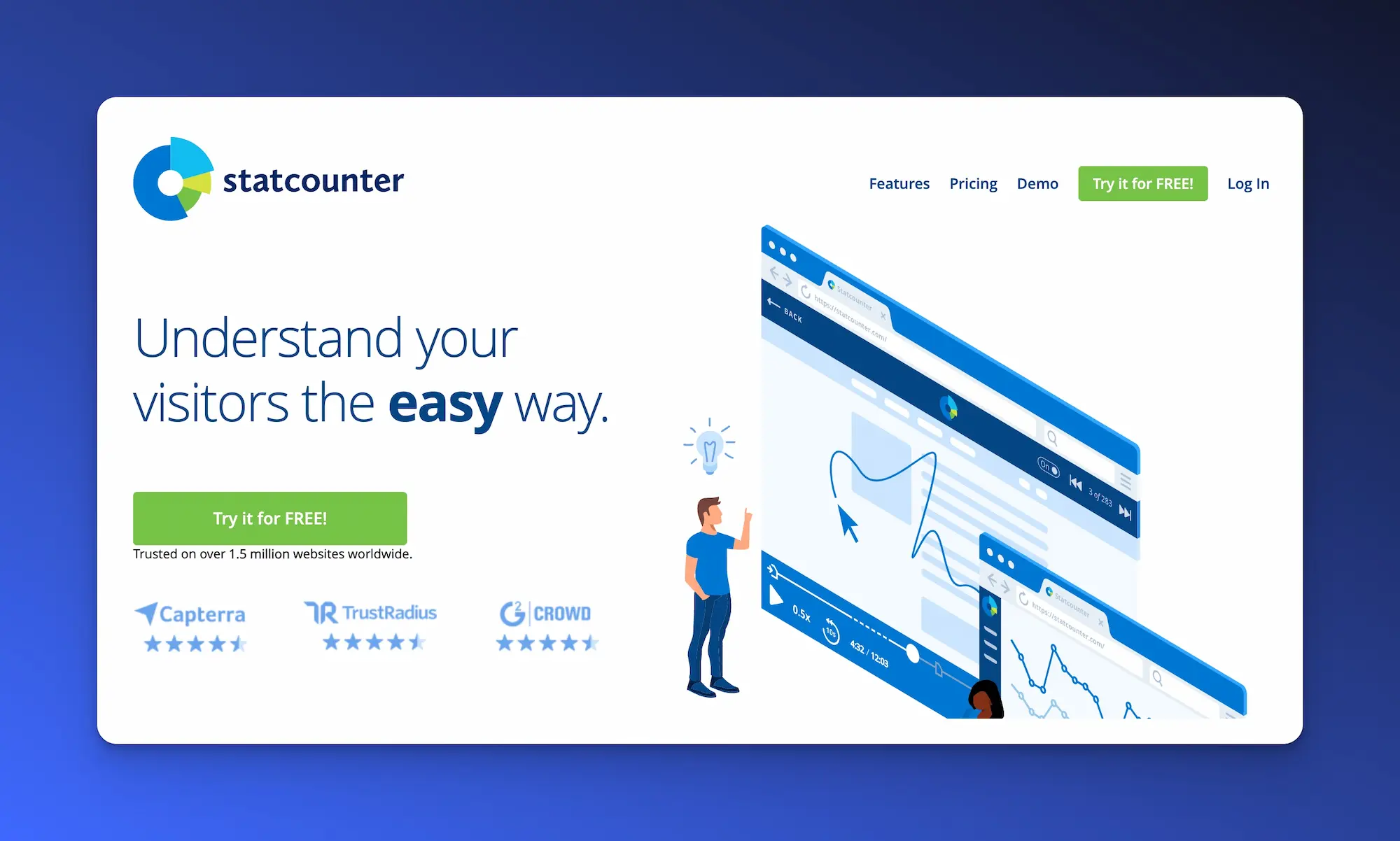
Statcounter is a straightforward, real-time website visitor tracking tool designed for small to medium-sized businesses. It provides essential analytics like page views, visitor locations, and referral data, helping you understand who’s visiting your site and how they’re finding it.
Statcounter’s key strength is its simplicity. It’s easy to set up and offers real-time tracking, showing you live data on user activity. The tool includes visitor paths, so you can see the journey each visitor takes through your site, and it also offers basic conversion tracking to measure goals like form submissions or purchases.
While Statcounter doesn’t offer advanced features like heatmaps or session recordings, its ease of use and real-time capabilities make it a solid choice for businesses that need basic website analytics without the complexity of larger platforms.
Key features of Statcounter:
Real-time visitor tracking: Monitor live user activity.
Visitor paths: See how visitors navigate through your website.
Basic conversion tracking: Measure key actions like signups or purchases.
Referral tracking: Understand where your traffic is coming from.
Pros:
Simple and easy to use.
Real-time data for immediate insights.
Great for small to medium-sized websites.
Cons:
Lacks advanced features like heatmaps or session replays.
Limited customization options.
Statcounter is ideal for businesses looking for an affordable, easy-to-use visitor tracking tool that provides real-time data on website activity.
Adobe Analytics
G2 Rating: 4.1 out of 5 (1031 reviews)
Best for: Enterprise-level analytics with deep insights
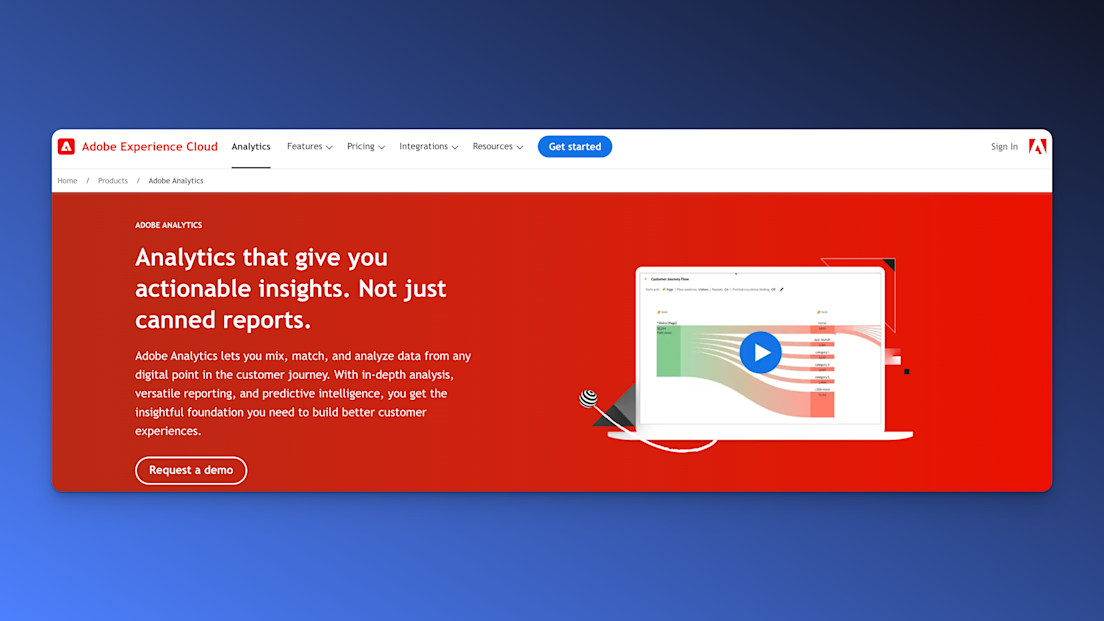

Adobe Analytics is a powerful, enterprise-level website visitor tracking tool that offers deep insights into user behavior. It’s designed for large organizations that need advanced data analytics and tracking capabilities, combining website data with insights from other digital channels like mobile apps and social media.
One of Adobe Analytics’ key strengths is its ability to integrate data from multiple sources, providing a complete view of your customers across different platforms. The tool offers advanced segmentation, cohort analysis, and predictive analytics, helping you understand how visitors interact with your website and predict future behavior.
Adobe Analytics also supports deep customization, allowing businesses to create tailored reports and dashboards that meet their specific needs. It integrates seamlessly with other Adobe tools, making it a great choice for businesses already using Adobe’s digital marketing suite.
Key features of Adobe Analytics:
Cross-channel tracking: Track visitors across websites, apps, and other digital channels.
Advanced segmentation: Group users based on detailed behavior data.
Predictive analytics: Forecast future user behavior and trends.
Customizable reports: Tailor dashboards and reports to your business needs.
Pros:
Enterprise-level tracking with advanced features.
Integrates with other Adobe products.
Highly customizable for large organizations.
Cons:
Expensive and complex for smaller businesses.
Steep learning curve for new users.
Adobe Analytics is ideal for large organizations looking for a powerful, customizable analytics platform that provides deep insights across multiple channels.
Kissmetrics
G2 Rating: 4.1 out of 5 (168 reviews)
Best for: Tracking customer behavior trends
Kissmetrics is a website visitor tracking tool that focuses on understanding user behavior and how it drives conversions. It’s designed to give businesses detailed insights into the customer journey, helping them identify patterns that lead to engagement, retention, and sales.
Kissmetrics offers event tracking, allowing you to monitor key actions like signups, purchases, and page views. It also provides user segmentation, helping you group visitors based on behavior and target them with personalized marketing efforts. One of the platform’s standout features is its ability to track individual users over time, giving you a clear view of how repeat visitors engage with your site.
Kissmetrics also includes funnel reports, which show where users drop off in key processes like checkout or lead generation forms. This data helps businesses identify bottlenecks and optimize user journeys for better results.
Key features of Kissmetrics:
Event tracking: Monitor user actions like clicks, form submissions, and purchases.
User segmentation: Group visitors based on behavior for targeted engagement.
Funnel analysis: Track user progress through key processes and identify drop-offs.
Customer lifetime tracking: See how individual users engage with your site over time.
Pros:
Focuses on behavior-driven insights.
Great for tracking individual user journeys.
Helps optimize conversions and user retention.
Cons:
Expensive for smaller businesses.
Requires technical setup to fully leverage features.
Kissmetrics is perfect for businesses that want to focus on user behavior and conversions, providing deep insights into how visitors engage with your website and what drives them to take action.
How to choose the right website visitor tracking software
Choosing the perfect visitor tracking tool can feel overwhelming, but breaking it down makes it manageable. Let’s walk through the key steps to help you make the best decision for your website.
1. Assess your needs
First, think about what your website requires. Are you a small business just starting out, or a large enterprise with complex needs?
Consider your technical expertise. If you're not tech-savvy, a tool with an intuitive interface is essential. Imagine effortlessly navigating through your analytics without feeling lost.
Next, identify the specific insights you need. Do you want to track user behavior, monitor conversions, or understand traffic sources? Knowing this will narrow down your options.
2. Consider your budget
Budget plays a crucial role in your decision. Determine how much you're willing to invest in a tracking tool.
Some tools offer free plans with basic features, perfect for startups or small websites. For example, Google Analytics is free and robust.
If you need advanced features, be prepared to invest more. Tools like Mixpanel might have higher costs but offer deeper insights. Balance what you need with what you can afford.
3. Evaluate feature requirements
List out the features that are non-negotiable for your business. Do you need real-time analytics, heatmaps, or user segmentation?
Imagine wanting to see exactly where visitors click on your page. Tools like Hotjar provide detailed heatmaps for this purpose.
Integration is another key factor. Ensure the tool can seamlessly connect with your existing platforms, such as your CRM or email marketing software. This creates a cohesive system that enhances your workflow.
Don’t forget about scalability. Choose a tool that can grow with your business. As your website traffic increases, your tracking needs will evolve. A scalable tool ensures you won’t outgrow your analytics solution.
4. Test before committing
Many tools offer free trials or demos. Take advantage of these to get a feel for the interface and features.
Imagine being able to explore the tool’s dashboard and reports before making a commitment. This hands-on experience helps you determine if it aligns with your needs.
Ask for feedback from your team. They might have insights or preferences that you hadn’t considered. Collaboration ensures you choose a tool that everyone is comfortable using.
5. Read user reviews and case studies
User reviews provide real-world insights into how the tool performs. Look for feedback on ease of use, customer support, and reliability.
Case studies showcase how other businesses have benefited from the tool. Picture similar companies achieving their goals with the tool you’re considering.
This information helps you make an informed decision based on others’ experiences, reducing the risk of choosing a tool that doesn’t meet your expectations.
Conclusion
Choosing the right visitor tracking tool can truly transform your website’s performance. Let’s quickly recap the top five we explored: Google Analytics, Hotjar, Crazy Egg, Mixpanel, and Matomo. Each offers unique features tailored to different needs.
Think about what matters most to you. Is it comprehensive data from Google Analytics, visual insights from Hotjar, or the privacy controls of Matomo? Your priorities will guide you to the best choice.
Don’t hesitate to take advantage of free trials. Testing the tools hands-on will give you a clearer picture of what fits your workflow. Remember, the right tool should feel intuitive and align with your goals.
Gather feedback from your team too. Their input can highlight aspects you might have overlooked and ensure everyone is on board with the decision.
Ultimately, the best visitor tracking tool is the one that helps you understand your audience and improve your website effectively. Make an informed choice, and watch your website thrive with the insights you gain.
Embrace the power of data, choose wisely, and set your website on the path to success.
You might also be interested in these;
Top 10 Digital Analytics Tools You Need to Know
Ultimate Website Optimization Guide: Must-Know Tactics
AUTHOR

Tope Longe
Product Analytics Expert
Ardent technophile exploring the world of mobile app product management at UXCam.
What’s UXCam?
Related articles
Website Analysis
Best Free Web Analytics Tools [2026]
Compare the best free web analytics tools for UX, product, and privacy. See why UXCam is the top choice for behavioral insights, compliance, and...

Jonas Kurzweg
Product Analytics Expert
Website Analysis
What is Web Analytics? Definition, Metrics & Best Practices
Discover what web analytics is, its definition, key examples, and the best tools to optimize your website's performance and user...

Tope Longe
Product Analytics Expert
Website Analysis
Website Heatmap - Ultimate Guide and Best Tools [2026]
Read the ultimate 2026 guide to website heatmaps: discover types, implementation, and the best heatmap tools to optimize user experience and site's...

Jonas Kurzweg
Product Analytics Expert
